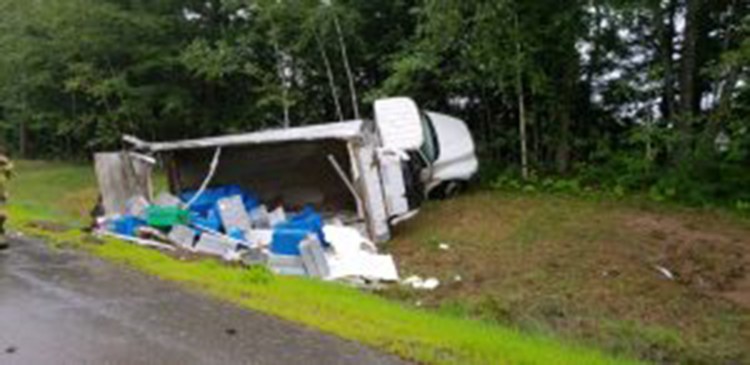The ruination of the crustaceans must be memorialized.
That’s the take of an animal rights group seeking state permission to erect a 5-foot-tall granite tombstone at the site of a lobster truck crash in Brunswick that resulted in about 7,000 pounds of live lobster being destroyed last week. Police didn’t know how many lobsters were in the truck, but assuming an average size of 1.5 pounds apiece would mean more than 4,500 lobsters died as a result of the crash.

An illustration submitted by PETA to state highway officials shows the proposed granite monument.
A memorial to the mass expiration of all those crustaceans would “remind everyone that the best way to prevent such tragedies is to go vegan,” says a letter from Danielle Katz, director of People for the Ethical Treatment of Animals.
A depiction of the would-be memorial shows a large image of a lobster and the words: “In memory of the lobsters who suffered and died at this spot August 2018, Try Vegan, PETA.”
The state Department of Transportation is reviewing the group’s request, spokesman Ted Talbot said.
Roadside memorials are considered “temporary signs” under state law, Talbot said. Temporary signs can be no larger than 4 feet by 8 feet, and may be placed in the public right of way for up to 12 weeks.
As lobster deaths go, the accident was a drop in the proverbial discarded shell bucket for Mainers: In 2017, 110 million pounds of lobster were harvested in Maine.
This isn’t PETA’s first effort this summer to curb people’s appetite for lobster. The group bought a month’s worth of ads posted at the Portland International Jetport in August featuring a lobster holding a sign proclaiming, “I’m ME, Not Meat. See the individual. Go Vegan.”
PETA argues that lobsters have feelings and “sophisticated” nervous systems – a belief that is at odds with scientists who say lobsters do not have well-developed nervous systems.
“Scientists have confirmed that lobsters have sophisticated nervous systems, and because crustaceans don’t enter a state of shock when injured, they feel every moment of their slow, painful death – whether from being torn limb from limb on the road or at the slaughterhouse or when they’re boiled alive in pots,” Katz wrote in her letter to transportation department.
In the Aug. 22 accident, a Cozy Harbor Seafood box truck carrying 60 to 70 crates of live lobster overturned on Route 1 in the Cook’s Corner area.
Police have said the truck likely hydroplaned in the rain, sending it rolling down an embankment, ripping the truck body apart and sending the boxes flying. The driver suffered minor injuries.
Cozy Harbor Seafood of Portland sent out another truck to get the lobsters, but found they were no longer marketable because they were unrefrigerated for too long and exposed to freshwater from the rain.
The lobsters in the accident, Katz wrote, “were packed into tight transport carriers, only to be violently thrown across the pavement, shells and limbs ripped from their bodies in the process.” The memorial, she said, “would be an effective way to remind truck drivers and Brunswick residents of their responsibility to fellow motorists and animals.”
Granite headstones can cost thousands of dollars, depending on the size and type of granite and carving.
Bob Bayer, executive director of the Lobster Institute at the University of Maine, has said all the research indicates that lobsters have nervous systems on a par with insects and likely don’t feel pain. However, Bayer acknowledged that scientists have not been able to definitively conclude whether lobsters feel pain, and the issue is likely to remain unresolved.
Noel K. Gallagher can be contacted at 791-6387 or at:
Twitter: noelinmaine
Send questions/comments to the editors.



